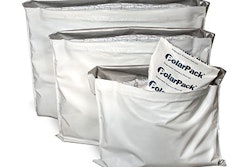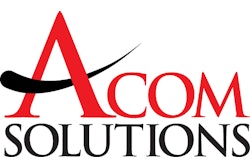New technology to provide better visibility; alert system monitors progress of critical shipments
Atlanta — March 1, 2004 — UPS Supply Chain Solutions has updated its customs brokerage service, offering new technology tools for better status visibility of shipments; alert systems to monitor the progress of critical shipments before, during and after customs clearance; and greater imaging capabilities for easier retrieval of documentation.
"The advent of more stringent security regulations, increasing documentation requirements and advanced notification about goods before they arrive at international destinations means that customs clearance is much more complex and unpredictable," said Norm Schenk, who leads brokerage services for UPS Supply Chain Solutions. "These enhancements are designed to keep goods moving quickly and efficiently across borders while keeping customers proactively informed about their international shipments in transit."
Each year, UPS Supply Chain Solutions files more than 4 million customs entries in the United States, allowing it to stake a claim as the nation's largest broker. It also has customs operations in 120 other countries.
Specific enhancements to the provider's offerings will include new options, via UPS' Flex Global View technology, that will allow customers to obtain multiple levels of detail about shipments. A "profiling and alerting" feature proactively informs customers when shipments reach defined key milestones during customs clearance. The "sensitive entry" watch list monitors specific shipments' progress, flagging those deemed critical by customers. And an individual "line item status" feature provides improved item-by-item visibility into consolidated customs entries.
"Greater visibility into the customs clearance process is critical for a smooth, synchronized supply chain," Schenk said. "Flex Global View gives shippers more information about their goods as those goods cross international borders so they, in turn, can inform their own customers."
UPS also is adding imaging enhancements that provide for the electronic capture and archiving of trade documentation, which can eliminate physical storage requirements and, UPS says, increase efficiency in retrieving stored records and make information immediately available for a faster audit cycle.
In related news, UPS and UPS Supply Chain Solutions have combined to create a single customs brokerage entity and have adopted a single filer code under UPS Supply Chain Solutions. The single unit processes customs entries for goods being delivered via UPS' small package network, as well as international air, ocean, ground and rail shipments managed by UPS Supply Chain Solutions as a customs broker and third-party logistics provider.
UPS says that the change will streamline the customs clearance process and eliminate the need for customers to have separate powers of attorney, databases and production information on file for both small package and freight shipments. UPS already is certified under two government-business initiatives designed to keep borders secure, the U.S. Customs-Trade Partnership Against Terrorism (C-TPAT) and Canada's Partners in Protection (PIP).
For more information on C-TPAT and solutions for supply chain security, see "Building the Secure Supply Chain," the Net Best Thing article in the June/July 2003 issue of iSource Business.
Atlanta — March 1, 2004 — UPS Supply Chain Solutions has updated its customs brokerage service, offering new technology tools for better status visibility of shipments; alert systems to monitor the progress of critical shipments before, during and after customs clearance; and greater imaging capabilities for easier retrieval of documentation.
"The advent of more stringent security regulations, increasing documentation requirements and advanced notification about goods before they arrive at international destinations means that customs clearance is much more complex and unpredictable," said Norm Schenk, who leads brokerage services for UPS Supply Chain Solutions. "These enhancements are designed to keep goods moving quickly and efficiently across borders while keeping customers proactively informed about their international shipments in transit."
Each year, UPS Supply Chain Solutions files more than 4 million customs entries in the United States, allowing it to stake a claim as the nation's largest broker. It also has customs operations in 120 other countries.
Specific enhancements to the provider's offerings will include new options, via UPS' Flex Global View technology, that will allow customers to obtain multiple levels of detail about shipments. A "profiling and alerting" feature proactively informs customers when shipments reach defined key milestones during customs clearance. The "sensitive entry" watch list monitors specific shipments' progress, flagging those deemed critical by customers. And an individual "line item status" feature provides improved item-by-item visibility into consolidated customs entries.
"Greater visibility into the customs clearance process is critical for a smooth, synchronized supply chain," Schenk said. "Flex Global View gives shippers more information about their goods as those goods cross international borders so they, in turn, can inform their own customers."
UPS also is adding imaging enhancements that provide for the electronic capture and archiving of trade documentation, which can eliminate physical storage requirements and, UPS says, increase efficiency in retrieving stored records and make information immediately available for a faster audit cycle.
In related news, UPS and UPS Supply Chain Solutions have combined to create a single customs brokerage entity and have adopted a single filer code under UPS Supply Chain Solutions. The single unit processes customs entries for goods being delivered via UPS' small package network, as well as international air, ocean, ground and rail shipments managed by UPS Supply Chain Solutions as a customs broker and third-party logistics provider.
UPS says that the change will streamline the customs clearance process and eliminate the need for customers to have separate powers of attorney, databases and production information on file for both small package and freight shipments. UPS already is certified under two government-business initiatives designed to keep borders secure, the U.S. Customs-Trade Partnership Against Terrorism (C-TPAT) and Canada's Partners in Protection (PIP).
For more information on C-TPAT and solutions for supply chain security, see "Building the Secure Supply Chain," the Net Best Thing article in the June/July 2003 issue of iSource Business.











